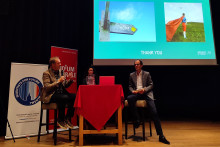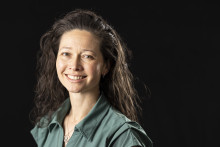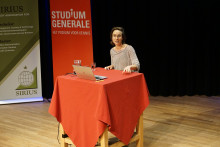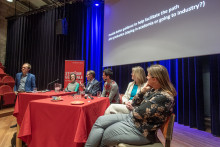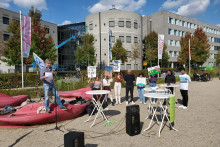With their Climate Centre Van den Berg and De Boer focus on education development and research. Through community based projects, the Centre works together with students and staff to put the ideas and plans into action. De Boer, also assistant professor at the ITC faculty, summed up the activities: ‘In our community we offer climate cafes where people are welcome to join and propose your ideas. We also invite people to climate colloquiums where scientists and innovators tackle the issue of climate change, we offer workshops and we undertake strategic partnerships.’
‘Climate crisis is a passion’
De Boer continued by explaining the Climate Centre’s so-called ‘geo-techno-social approach’ and the importance of including internal and external stakeholders and combining practical and disciplinary knowledge. ‘The reason why I am focusing my expertise in this climate centre is because the climate crisis caught a lot media attention. We work with the Japanese concept of ‘Ikigai’ and I asked myself: ‘How can I find my role in this?’ The climate crisis is a passion for me, to make the world a better place.’
‘We know that at the UT we are quite strong in tackling the geo and tech approach, due to the massive amount of academic staff and students.’ But in order to change the behaviour of people and to undertake the transition, there is also a need to train people, said de Boer. ‘Together with the BMS faculty, we do research on behavioural change.’
Van den Berg added: ‘In our centre we have between 50 and 100 people working on our approach.’ In the future, he would like the Climate Centre to collaborate with Saxion University of Applied Sciences and ROC Twente. De Boer added: ‘We are currently working on our year plan, where students could volunteer.’
‘Depressed students’
Van den Berg and De Boer want to further expand the Climate Centre, to have it enable the transition to a ‘low carbon society’. ‘We emphasise on the transdisciplinary solutions and focus on the external partners. Our mission is to empower students and staff to contribute to climate change.’
The UT researchers notice a lot of movements and activists participating in protests. ‘We see around us that especially students are depressed due to the consequences of the climate crisis,’ says De Boer. ‘If we act together, we can create a bigger community and impact.’
Active participation climate movement
In the second half of this Studium Generale lecture, Ernst-Jan Kuiper explained about his work as a climate scientist. Besides that, he is an Extinction Rebellion activist. ‘I was 18 years old when I started to be interested in climate change, this was in 2006.’ During the discussion Kuiper gave a quick update on the numbers if we would decrease the emissions or what happens if we would not.
Kuiper changed his behaviour by decreasing the amount of meat he was eating and voting for green parties. ‘I realised this had just little impact and it did not go the way I wanted. In 2018 I got in a deep climate crisis depression. When I finished my PhD I felt there was a change. I joined Extinction Rebellion because the movement has an urge, we are serious.’
Major social change
Extinction Rebellion is a non-violent activist environmental movement that started in the United Kingdom. ‘We want to be disruptive, for the government to take action towards climate change’, said Kuiper. ‘If you look at the past, Gandhi and Rosa Parks were examples of people who stood up for their rights. After their actions, there was a major social change. We as a movement also want implement that at an incredible speed. And with success, you could see that when we blocked the A12 highway in the Netherlands, that the police did not know what to do. In the beginning they did not have the capacity to remove us. There are always people who criticise us, but it actively works. The parliament recently adopted a motion to stop the fossil fuel subsidies.’
During a closing Q&A session with the audience, Van den Berg asked Kuiper on how he chooses his actions. Van den Berg mentioned that gluing yourself to a painting in a museum draws a lot of attention and could work for a non-violent movement. Kuiper responded: ‘I am afraid of that, I won’t do it.’ Someone in the audience expanded on this question and mentioned: ‘Activists who are part of this movement do not only glue themselves to a surface or something similar, they also do other things.’


